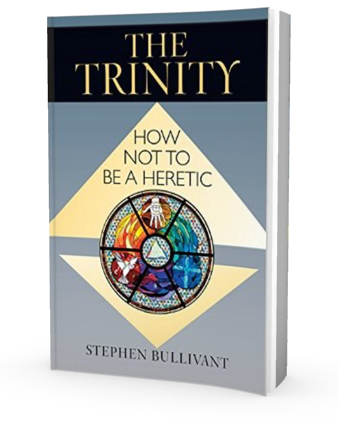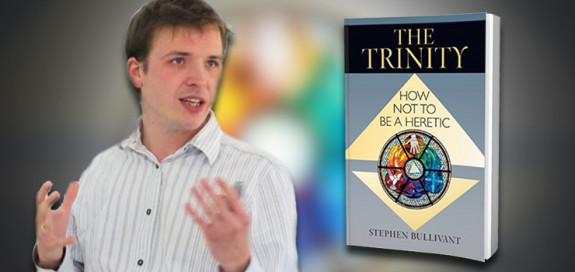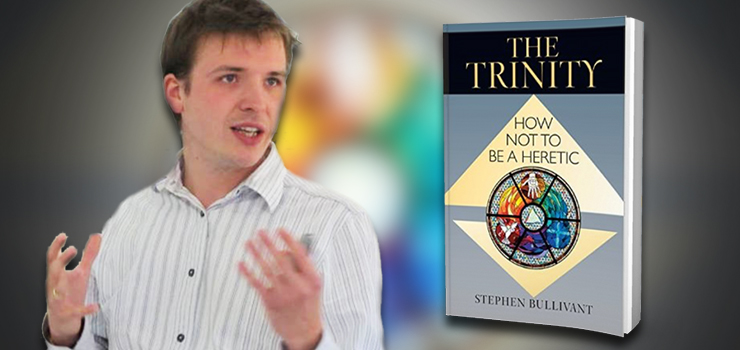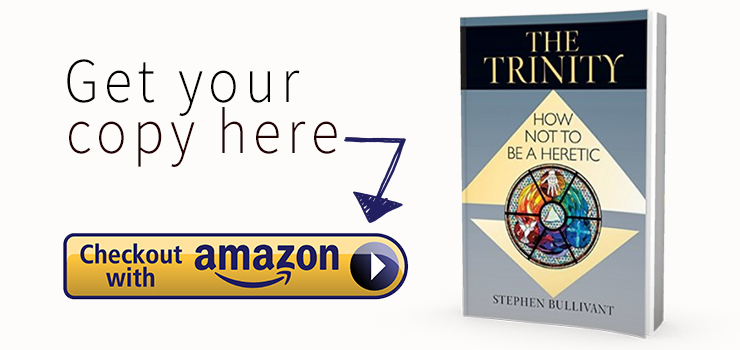I first met Dr. Stephen Bullivant a couple years back and we hit it off immediately. He’s über-smart (he earned his doctorate in theology from Oxford) and has a delicious sense of humor. You can’t help but like him.
Stephen converted to Catholicism in 2008 (same year as me) and has since developed an impressively wide mastery of topics such as atheism, secularism, the new evangelization, and Catholic social teaching.
He has authored several books, including Faith and Unbelief (Paulist Press, 2014), The Salvation of Atheists and Catholic Dogmatic Theology (Oxford University Press, 2012), and The Oxford Handbook of Atheism (Oxford University Press, 2013), which he co-edited with philosopher Michael Ruse.
His newest book is titled The Trinity: How Not to Be a Heretic (Paulist Press, 2015) and that’s what I’m interviewing him about today.
BRANDON VOGT: In theological circles, the Trinity is jokingly considered the untouchable subject. Many pastors avoid preaching on it and most Catholics in the pew consider it an impenetrable mystery. However, you decided to write a whole book on it! What inspired you to tackle this difficult topic?
STEPHEN BULLIVANT: First off, Brandon, thanks very much for welcoming onto these hallowed pages; it’s an honour to be here.
As to your question, to be honest I think you’ve just answered it yourself! “Trinity” is Christianity’s most basic description of who God is, who he has revealed himself to be, and who he needs to be in order to save us. St. Augustine put it best when he used the phrase (as he did quite often) “the Trinity, who is God.” So that means all Christian theology is (or ought to be!) trinitarian theology, all Christian prayer is (or ought to be!) trinitarian prayer, and so on.
All Christians should, therefore, feel confident in talking about it; at the very least, they should feel secure that they know what the word actually means. But, as you rightly point out, they don’t. And that’s exactly why I’ve written the book.
BRANDON VOGT: The Trinity is often deemed a “mystery” of faith. What does this mean? Can we know anything about God’s Trinitarian nature or is it completely unintelligible?
 STEPHEN BULLIVANT: As St. Thomas Aquinas says “God is above whatsoever we may say or think of Him.” All our finite, creaturely words, thoughts, and ideas fall short of the infinite Creator. We’re never going to be able to plumb the full depths of who God is, or exhaust the full mysteries of “the Most High” (Psalm 91:1) – at least, not this side of heaven. “For now we see in a mirror, dimly…” (1 Corinthians 13:12).
STEPHEN BULLIVANT: As St. Thomas Aquinas says “God is above whatsoever we may say or think of Him.” All our finite, creaturely words, thoughts, and ideas fall short of the infinite Creator. We’re never going to be able to plumb the full depths of who God is, or exhaust the full mysteries of “the Most High” (Psalm 91:1) – at least, not this side of heaven. “For now we see in a mirror, dimly…” (1 Corinthians 13:12).
Yet that doesn’t at all mean that we can’t know or say anything about God. Cardinal Ratzinger once wrote that ‘we cannot speak rightly about God unless God himself tells us who he is.’ But that’s exactly what Christians are convinced God has done: most especially in person, as Jesus of Nazareth. The fact that the second person of the Trinity became a “man among men” (St Irenaeus’ phrase), and used ordinary human language to tell us about himself, the Father, and Holy Spirit, is the main reason we can be sure that God’s nature really is trinitarian.
The Church’s whole doctrine of the Holy Trinity—and all the seemingly arcane, theological discussions and disputes surrounding it—is basically an attempt to be faithful to God’s self-revelation.
BRANDON VOGT: Throughout the book, you list three key facts that sum up the orthodox view on the Trinity. What are they and why is each important?
STEPHEN BULLIVANT: The book’s opening sentence is “This is a simple book about an even simpler subject: the doctrine of the Holy Trinity”—and I absolutely mean that. The word Trinity is simply a shorthand way of affirming three easy-to-understand, deeply scriptural statements:
1. There is only one God.
2. The Father, the Son, and the Holy Spirit is each God.
3. The Father, the Son, and the Holy Spirit are not the same.
And that’s it. Each is important, precisely because our God “who tells us who he is” had communicated each of them to humanity. The early Church was so convinced of this, that even though it took them several centuries to find a more-or-less satisfactory way of “saying all three things at once,” they steadfastly refused to downplay or deny any of them.
BRANDON VOGT: The tongue-in-cheek subtitle of your book is “How Not to Be a Heretic.” What are some of the most common heretical views concerning the Trinity?
STEPHEN BULLIVANT: I think one of the most useful things about thinking about the doctrine of the Trinity in terms of those three, simple sentences—what I call in the book the “trinitarian trilemma”—is that the often very arcane and convoluted-seeming controversies of the first few centuries become very easy to understand (and hence avoid!).
There are three main trinitarian heresies, and each amounts to an attempt to deny one of the above statements, while upholding the other two. Modalism, for example, denies the third statement. It attempts to explain away the threeness of the Trinity by saying that “Father,” “Son,” and “Holy Spirit” are just different names or roles that the one God assumes—just like one actor playing three different characters. (In the same way: Borat, Brüno, and Ali G might seem different, but they’re really all just Sacha Baron Cohen in different clothes and putting on different voices.)
Arianism, meanwhille, denies that Father, Son, and Holy Spirit is each truly God (i.e., it denies our second statement). For Arius, the Son was a created being, like a kind of super-angel, and not therefore ‘true God from true God’ (as the Nicene Creed puts it).
Finally, tritheism denies that there’s only one God (statement one): Father, Son, and Holy Spirit are separate gods, a kind of celestial Three Amigos.
Obviously, there’s a lot more that can be said about each of them in terms of both history and ideas (the book devotes a chapter to each one). But that gives you the basic gist.
BRANDON VOGT: The book includes a helpful Afterword on “How to Be an Ecumenist,” which suggests the Trinity is the “preeminent source of doctrinal common ground” between Catholics and other Christians (Protestants, Orthodox, etc.) What role does the Trinity play in the pursuit of Christian unity?
STEPHEN BULLIVANT: That’s a great question. Pretty much every mainstream Christian tradition (and a vast number of the ‘minorstream’ ones too!) affirms the consensus understanding of the Trinity that got worked out in the Church’s first three or four centuries . And that’s because they all share a common history in that period: all the significant, lasting schisms in Church history happened afterwards.
It’s essential to remember, therefore, that “that they all may be one” (John 17:21) isn’t just some hoped-for ecumenical future: we really were all one during the the Church’s formative centuries. Whatever differences have separated us since, and whatever the reasons why, the very fact it even makes sense to be praying for Christian re-unity ought to encourage us. And one of the main reasons it does make sense is because we all share the same basic understanding of “the Trinity, who is God.”



